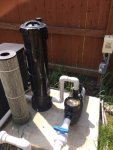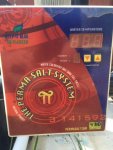So...last year we had an in ground pool built by Family Leisure. They installed a cartridge filter system and a perma salt system. We don't use chlorine and it's not a salt generator, it uses minerals, copper and silver to maintain the pool.
This year was our first time opening the pool and it's been a disaster! When we removed the cover a bunch of leaves and dirt from the cover poured into the water....we have been fishing leaves out for 4 weeks! All of the leaves are gone now so we bought the chemical package for our pool, $300 and began putting in the chemicals. Within a couple of days the water was so cloudy we couldn't see the bottom of the pool. $500 in chemicals later, we poured in Super Floc and shut off the pump. The water cleared up overnight, and everything sank to the bottom of the pool. But as soon as we turned on the pump to vacuum it out the water became cloudy again and we can't see the bottom. I have been cleaning the filter cartridge every day to make sure it doesn't clog up. Whenever we put the hose into the skimmer to vacuum, it loses suction after a few minutes and takes 10-15 minutes to get back to pumping normal.
I have called 4 different pool companies and all have told me to get rid of the cartridge filter and perma salt system and purchase a chlorine system and sand filter. Estimate are all over $1,000 to do this...
Is there anyone on here that has had success with a combination of perma salt and cartridge filters? If so, do you have any suggestions for getting this thing going so we can get some use out of the pool this summer!!??
This year was our first time opening the pool and it's been a disaster! When we removed the cover a bunch of leaves and dirt from the cover poured into the water....we have been fishing leaves out for 4 weeks! All of the leaves are gone now so we bought the chemical package for our pool, $300 and began putting in the chemicals. Within a couple of days the water was so cloudy we couldn't see the bottom of the pool. $500 in chemicals later, we poured in Super Floc and shut off the pump. The water cleared up overnight, and everything sank to the bottom of the pool. But as soon as we turned on the pump to vacuum it out the water became cloudy again and we can't see the bottom. I have been cleaning the filter cartridge every day to make sure it doesn't clog up. Whenever we put the hose into the skimmer to vacuum, it loses suction after a few minutes and takes 10-15 minutes to get back to pumping normal.
I have called 4 different pool companies and all have told me to get rid of the cartridge filter and perma salt system and purchase a chlorine system and sand filter. Estimate are all over $1,000 to do this...
Is there anyone on here that has had success with a combination of perma salt and cartridge filters? If so, do you have any suggestions for getting this thing going so we can get some use out of the pool this summer!!??


 Welcome to TFP!!!
Welcome to TFP!!!

